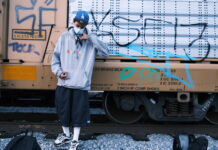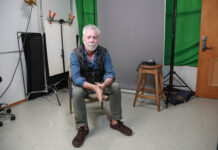Gil Riego, Jr.
Immortality may seem impossible, but each person lives as a walking epitaph to the ones who have impacted their existence and the existence of those who affected them; albeit a celebrity, public worker, family member or even teacher.
Carnegie Mellon University professor Randy Pausch, after being diagnosed with pancreatic cancer, took it upon himself to reach out to a large audience. Pausch’s forum for spreading his message was his book “The Last Lecture,” and his actual final lecture “Really Achieving Your Childhood Dreams.”
The 47-year old Pausch diverted from his normal teachings of computer science to talk about life and happiness in his final speech to more than 450 of his students, colleagues and friends.
In respect to the legacy of Pausch, Pierce College professors weigh in on how they feel they keep themselves in touch with as many lives, what stands out in their life and what they would give as their last lecture.
These professors give a view on how to save the world, yourself and to find happiness.
Kathy Daruty, Pierce Professor of Business since 1979
Q:How do you feel that you’ve
changed lives?
I can only judge that by what I hear back from people, years later. I get e-mails from people that left here ten years ago, and they tell me, or I get nominations for “Who’s Who Among America’s Teachers,” and that is a student that says, “Pick the one person that’s made the most influence on you.”
Q:What made you decide to be a teacher?
I had a degree in business and was working in the industry. I hated it. They wanted me to serve coffee.
I had a 4.0 out of USC. I took statistic and calculus and I wasn’t going to serve coffee.
Then while camping with some friends at Big Sur and I realized I didn’t want to live in the city. I wanted to get out.
That’s when I decided that grad school is what made sense. I could get a master’s degree, I could get a community college teaching job. I didn’t realize that I would like teaching until the first night I ever did it. I was looking at other issues.
Q:When did you realize you
love teaching?
The first night I taught a class, I lecture for three hours, I left the room and was whipped. I thought to myself “This is hard work,” while walking back to my car.
Then as I put the key into the door of my car and it occurred to me: “They’re gonna pay me!”
Now when you do something that you’re so tired, and yet after you’re done, it’s an afterthought that they are going to pay you, You’ve found what you should be doing in life.
Q:What would your
last lecture cover?
It would cover the importance of three things in life. I look at life like a three-legged stool.
The first leg is to find a partner in this life that you share everything with. That’s the single most important thing.
The second is to find work you love. You need to think about what you love doing, not what is going to be the best paying job.
The third is what Aristotle calls “being sufficiently supplied with material necessities:” managing your finances. You’re secure in your home and future. You’re not buried in debt.
Q:Where would you have your last lecture?
Pierce College. I’ve given my life and my love to this place.
There’s no better place on the Earth. It’d be in 3218, where I’ve spent the last 30 years of my life.
There is no place on the planet that brings together finer human beings than on Pierce College.
Craig Meyer, Pierce Professor of Environmental Science since 1975
Q:How do you feel that you’ve changed lives?
What’s most important would be the influence (students) who don’t become majors in environmental science or geology. The ones going out to become business majors or social services and they now understand what limits nature puts on them, what’s reasonable to do. They have a perspective that hasn’t been shared by previous generations of business people or those in the science directly.
Q:What is one of the more memorable moment in your career?
Last year we applied for a grant for a student research project from the (Environmental Protection Agency) that I never expected to get because it’s difficult for community colleges to compete with fourw-year schools.
Our team got to go to Washington D.C. to present our results, and we were the only community college in the country to do that.
We were there sitting: Princeton. Penn State. Berkeley. Us.
Q:What would your last lecture cover?
Your generation is going to have to be the one to make the changes to save the species.
We’re damaging our life support systems beyond repair, and though they haven’t yet failed, they are in the process of failing now. If we don’t do any significant changes we’re going to have a real catastrophe.
It’s not at all uncommon for a species to be extremely abundant and then physically change the character of it’s environment until it no longer fits him, so there’s precedent here.
The challenge for this generation is that the changes we need to make have no history precedent.
We’ve never been in a position when the world is full, where we were at limited resources. Where our economic growth was causing our life support system be stressed.
I would council students to start looking to develop the mind-set to make the changes. Because if they don’t nature is going to do it for them, and Nature won’t do it gracefully.
Q:Where would you have your last lecture?
It would have to be broadcast. I’d pick a nice interesting venue that would be fun to be at.
Some great wilderness area, where I could go fishing when it was over. As long as it was my last lecture, I might as well get my last fish in.
I really don’t think the venue is that critical. It’s the audience that’s critical.
It was just for the students I’ve known or interacted with, I’d probably give it in one of the big lecture halls.
“Noble” Eisenlauer, Pierce Professor of Anthropology since 1990
Q:How do you feel that you’ve changed lives?
I’m very blessed that students think enough of me to want to come back and share their post-graduations experiences with me. I use their experiences to tell current students how others have fared in the outside world.
I think part of it is because I let them know I am interested in their lives. I feel that I have a good rapport with my students.
Q:What stands out for you in your teaching career?
I was invited by a couple of former students to attend their graduation at University of California, Santa Barbara. One of them came in (to my course) as a happy-go-lucky, not-too-focused, not really interested-in-grades kind of guy.
When he was given his UCSB diploma, he stopped the whole proceedings, and put a special dedicatory shawl around my neck that signified that I was the most influential professor of his career.
He told me “Thank you for getting me here.” I thought it was quite an honor.
He ended up with a fully paid scholarship to the University of Chicago, and is earning his doctorate in anthropology.
Q:What would your last lecture cover?
In subject matter, I’d like it to cover life, and not just anthropology. I think we’re diluting ourselves that as professors we sit in the classroom and think we are adequately preparing students for survival in the real world, if we just teach our discipline.
If you asked any of my students you’d see that they are taught several different things.
I know we have specialized classes, but I don’t feel good unless we give them some sort of rounded (education).
I would basically say, “look at what’s around you. This is what you’re entering when you leave this campus. Somewhere you have to find a place for yourself here.”
I managed to do it by following a desire I had, and I was happy doing what I was doing, and I will go to my grave being happy that I made a choice that pleased me, gave me a sense of fulfilment and now you have to do that.
Q:Where would you have your last lecture?
If I had one last lecture, I’d have it outdoors, somewhere on campus but away from the din of traffic.
Somewhere where you can feel the breeze. Where you can see the grass sway. Where you can watch the animals.
Q:How would you end your lecture?
Take the time to appreciate everything that’s around you. Take nothing for granted… and be happy.

“Nobel” Eisenlauer ()

Craig Meyer ()

Kathy Daruty ()


